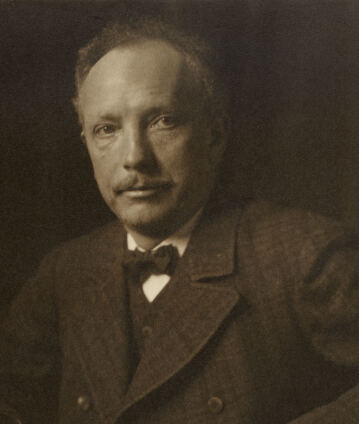Richard Strauss and his tone poems

The tone poems of Richard Strauss are among the most striking and virtuosic works of the orchestral literature. This playlist contains outstanding recordings of these nine works. You will meet literary heroes such as Don Juan and Till Eulenspiegel, experience music inspired by philosophy in Also sprach Zarathustra (Thus Spoke Zarathustra) and enjoy powerful spectacles of nature in the Alpensinfonie (Alpine Symphony) with the Berliner Philharmoniker and the great Strauss conductors of our time.
The name of the genre symphonic poem comes from Franz Liszt (Strauss himself preferred the term tone poem), but several works by Hector Berlioz and Richard Wagner’s theoretical writings also contributed to the development of the new form. Like Wagner, many of his successors were convinced that the history of the symphony had been perfected and brought to a close with Beethoven’s Ninth. In the future, instrumental compositions were also to refer to extra-musical programmes.
Richard Strauss based his tone poems, which were composed between 1886 and 1915, on writings by Shakespeare, Cervantes and Nietzsche. They include humorous episodic narratives in Till Eulenspiegels lustige Streiche (Till Eulenspiegel’s Merry Pranks), natural phenomena and scenes from his own family life in the unusual Symphonia domestica. The spectrum of these works, which were the basis of the composer’s initial success, ranges from the early works Don Juan and Tod und Verklärung, both tempestuous but in very different ways, to Also sprach Zarathustra, which Stanley Kubrick used in his film 2001: A Space Odyssey, to the monumental Alpensinfonie (Alpine Symphony), with which Strauss concluded his cycle of tone poems.
The Berliner Philharmoniker are a Strauss orchestra par excellence. The composer often appeared with the Philharmoniker himself and conducted the premiere of the final version of his Macbeth in Berlin. After Hans von Bülow’s death in 1894, he even acted as an interim conductor of sorts until Arthur Nikisch was appointed as the new chief conductor. Herbert von Karajan’s Strauss performances still enjoy legendary status. The very first CD released featured Karajan’s interpretation of the Alpensinfonie with the Berliner Philharmoniker. They also made a memorable film of a performance of Don Quixote with the great cellist Mstislav Rostropovich representing the tragi-comical hero. The Strauss tradition continued after the Karajan era. Claudio Abbado conducted a staged production of Elektra, and Sir Simon Rattle led productions of Salome and Rosenkavalier. The film Trip to Asia centres around the interpretation of Heldenleben (A Hero’s Life) under Sir Simon. His successor as chief conductor of the Berliner Philharmoniker, Kirill Petrenko, is acclaimed not least for his magnificent interpretations of Strauss’s works.
One year before taking office, he conducted two tone poems by the composer in the opening concert of the 2018/19 season. Along with such seasoned maestros as Zubin Mehta, Neeme Järvi, Semyon Bychkov and Daniel Barenboim, younger conductors such as Gustavo Dudamel, Daniel Harding and Andris Nelsons are also strongly drawn to the composer’s music. His works contain an almost unsurpassed wealth of imagery and drama, timbres and moods and as such are an ideal test of conducting skills – and also always a challenge for orchestra members: the tone poems often contain notoriously virtuoso parts for solo violin – for example in Ein Heldenleben and Also sprach Zarathustra – which are played by first concertmasters of the Philharmoniker in the Digital Concert Hall recordings.
Our recommendations
- Russian music with the Berliner Philharmoniker
- The “Late Night” concerts with discoveries for night owls
- The Berliner Philharmoniker at the Waldbühne: musical highlights from all over the world
- Famous cello concertos: From the First Viennese School to the 20th century
- Familiar works heard anew: Musical metamorphoses
- Summertimes: Summer music with the Berliner Philharmoniker